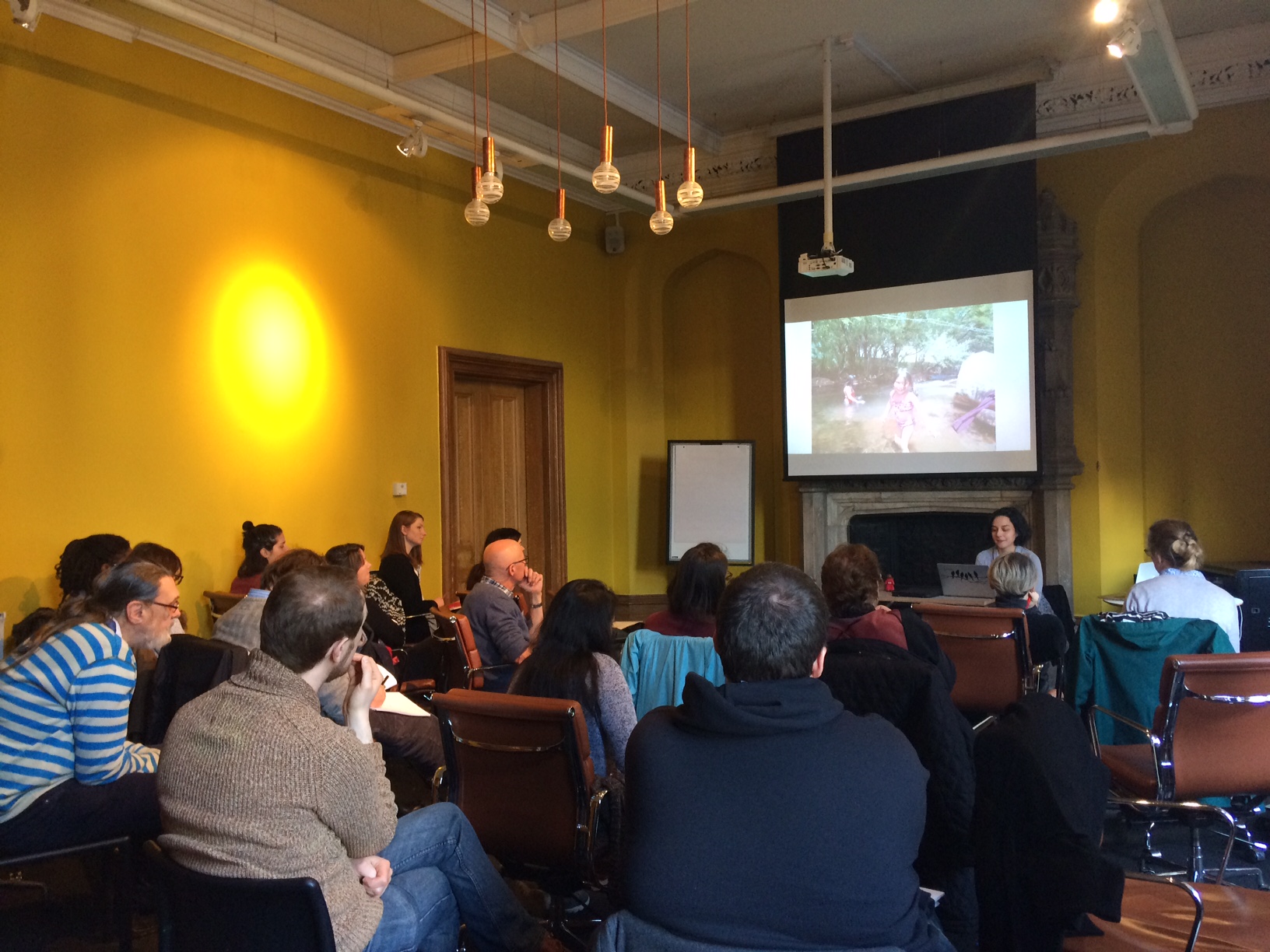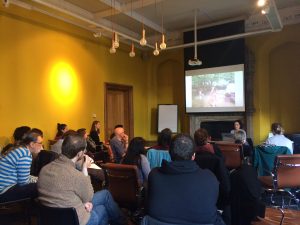
Notions of family and kin terms vary in complexity and structure, so to what extent does linguistic and cultural variation affect the acquisition of kinship knowledge? While kinship provides the major framework for social organisation in many societies, we still know very little about how children learn to categorise different kinds of kin. The ‘Children’s Acquisition of Kinship Knowledge: Theory and Method Workshop’, led by EXCD lab of University of Bristol, provided a unique opportunity to explore and refine ideas in this largely overlooked area of research. Early-career researchers and distinguished academics alike, from anthropology, linguistics and psychology, gathered at The Engine Shed, Bristol in late January 2018, to propose theories and share in discussion. The result was a truly stimulating event.
Kicking off the two-day workshop, Professor Fiona Jordan’s introduction emphasised the EXCD lab’s interdisciplinary approach, highlighting the restricted variation of kinship systems, the question of ‘unthinkable families’ and the notable diversity of cousin systems around the world. Eve Danziger, Professor of Linguistic Anthropology at the University of Virginia, followed with a consideration of the syntactic and pragmatic parallels between kinship and spatial relationship terms, and their origins in “gesture-calls”. Using kinship acquisition data from her fieldwork with Mopan (Mayan) speakers, Eve showed how cultural elaboration of respect for elders complements the semantic feature “sex-of-senior”, producing cultural and cognitive consequences for sense of self.
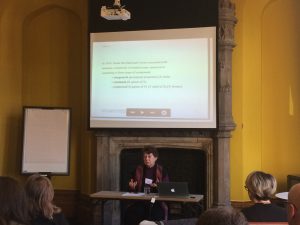
Eve Clark, Professor of Linguistics at Stanford University, our second speaker of the day, offered interesting reflections on her pioneering 1974 study of the semantic complexity of kinship term acquisition using elicited definitions. This fresh perspective suggested further consideration should be given to children’s experience with kin terms in their communities, looking at both address and third-person reference.
Next, we heard from Bob Parkin, Emeritus Fellow of Oxford University’s School of Anthropology who considered the lack of current research on children’s learning of kinship within social anthropology. Bob’s presentation pointed towards the widespread anthropological objections to Malinowski’s extensionism, its unsuitability to all terminologies and its shortcomings as a universal theory of learning. We then heard about infants’ observational learning skills from Tanya Broesch, Assistant Professor of Psychology at Simon Fraser University. Tanya told us about learning from behavioural cues such as infant-directed speech, gestures, and facial expressions and how these cues aid interpretation of complex group member information such as defining friend or foe. The talk included an overview of Tanya’s multi-methods, cross-cultural approaches and her current data, collected via natural observation in multiple societies.
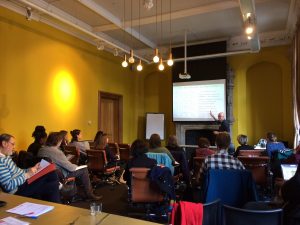
After lunch, a close analysis of the acquisition of kinship concepts in Australian Murrinhpatha-speaking communities followed, with interactional linguist Joe Blythe, of Macquarie University. Joe’s personalised experiments involved photos of individuals from each child’s genealogy, along with pre-recorded audio clips and stick figure animations, in order to determine children’s comprehension of kinterms. Leading on from this, EXCD team member, linguistic anthropologist Alice Mitchell of the University of Bristol, presented preliminary findings into kinship learning among Datooga children of Tanzania, as studied over nine months of fieldwork. Initial observations focused on child-anchored kin terms as a source of information for children. She then considered children’s understanding of the kin term for ‘mother’ and the apparent resistance to the use of word when referring to classificatory mothers.
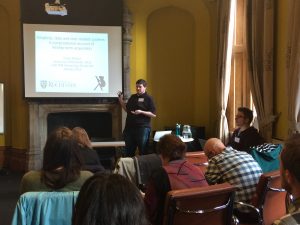
As the afternoon progressed, we heard from Francis Mollica of The Computational & Language Laboratory, University of Rochester. Using a probabilistic Language of Thought model, Frank discussed simulations scrutinizing how simplicity, data distributions and assumptions about relatedness interface, giving rise to behavioural effects observed in children. These included a trajectory from under- to over-extension of kinship terms, and, in the case over over-extensions, the characteristic-to-defining shift. The next presentation, by Annie Spokes from Harvard University’s Department of Psychology explored conceptual understanding of kinship as a social category and expectations for social interactions in 3-5 year old children in the US. She also examined how infants track relationships in care-giving networks within the first two years of life, forming expectations and early inferences about kin.
Julia Nee of the Department of Linguistics at Berkeley addressed us for the final session of the day via video-link. Julia’s field research with Teotitlan del Valle Zapotec speakers allowed her to examine whether languages show an optimization of complexity and communicative cost in dividing up the semantic domain of kinship, compared with English-speaking participants. Having covered a great deal of ground on the first day, workshop attendees met for dinner in central Bristol during the evening and talked over research ideas and experiences.
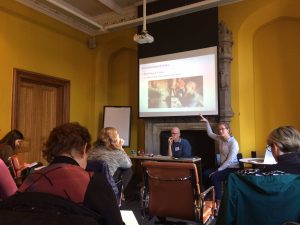
Friday provided an opportunity to focus on research methods. Joe and Alice introduced the first hour with a talk on elicitation and experiments. Camilla Morelli, Lecturer in Anthropology at the University of Bristol, then provided an overview of the use of visual and sensory methods in child-centred anthropology. Drawing on her ethnographic fieldwork with indigenous children in the Peruvian Amazon, Camilla suggested ways in which such techniques can be applied when investigating kinship and the acquisition of kinship knowledge.
After a morning break, we heard again from Joe and Alice who led a wide-ranging discussion about linguistic and corpus-based methods. This useful, interactive session provided an opportunity for a closer exploration of the various approaches. Their two methods talks covered questionnaires and surveys for eliciting definitions and factual information, stimuli-based tasks using photos and/or dolls, and collecting behavioural data, both linguistic and non-linguistic. The discussion provided an opportunity to appraise successes and difficulties encountered in each of the approaches and the group exchanged experiences in the field.
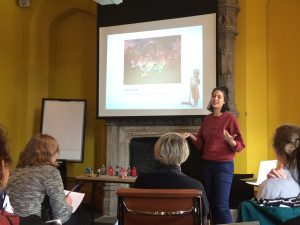 We were then delighted to hear presentations from three early-career Phd Researchers. Sheina Lew-Levey from Cambridge University’s Dept of Psychology outlined her recent findings into the transmission of foraging knowledge as well as social and gender norms through play, word-play and teaching among Mbendjele forager children in the Congo Basin. Noa Lavi of Cambridge’s Anthropology Dept followed, with an overview of kinship concepts and flexible patterns of relationality among the Nayaka, hunter-gatherers in Nilgiri, South India. Noa described how Nayaka children’s knowledge and knowledge acquisition are based on gradual learning of the ability to alternate between different kinship concepts. Lastly, Gabriella Piña, a social anthropologist from the London School of Economics, talked about her work with the Pehuenche people of Southern Chile. In this society, independence and freedom are highly valued and offset by the practice of visiting and hosting, to support collaboration and avoid tension. She examined children’s participation in these activities and how these practices develop their understanding of kin.
We were then delighted to hear presentations from three early-career Phd Researchers. Sheina Lew-Levey from Cambridge University’s Dept of Psychology outlined her recent findings into the transmission of foraging knowledge as well as social and gender norms through play, word-play and teaching among Mbendjele forager children in the Congo Basin. Noa Lavi of Cambridge’s Anthropology Dept followed, with an overview of kinship concepts and flexible patterns of relationality among the Nayaka, hunter-gatherers in Nilgiri, South India. Noa described how Nayaka children’s knowledge and knowledge acquisition are based on gradual learning of the ability to alternate between different kinship concepts. Lastly, Gabriella Piña, a social anthropologist from the London School of Economics, talked about her work with the Pehuenche people of Southern Chile. In this society, independence and freedom are highly valued and offset by the practice of visiting and hosting, to support collaboration and avoid tension. She examined children’s participation in these activities and how these practices develop their understanding of kin.
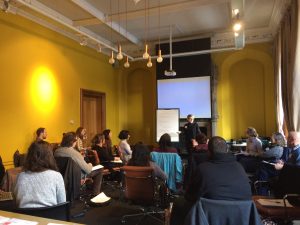
Friday afternoon was dedicated to a round-up discussion. The group gathered in an open session to exchange views on the creation of a ‘field-kit’ intended to aid the study of the acquisition of kinship terms, for use by the group and other researchers.
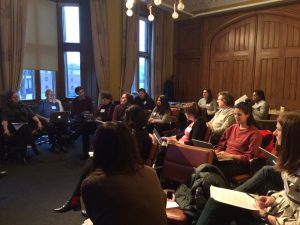
In addition, as an ongoing interest, the group intend to make a joint interdisciplinary contribution towards a forthcoming article which will address a universal set of concerns relating to kinship acquisition. Most notably, the event was the first of its kind in its interdisciplinary draw and related events are likely to follow. One of the most considerable outcomes of the workshop has been the momentum created for future ventures and collaborations around developing the questions of kinship, forming new ideas and attracting newer researchers from an even greater diversification of approaches.
